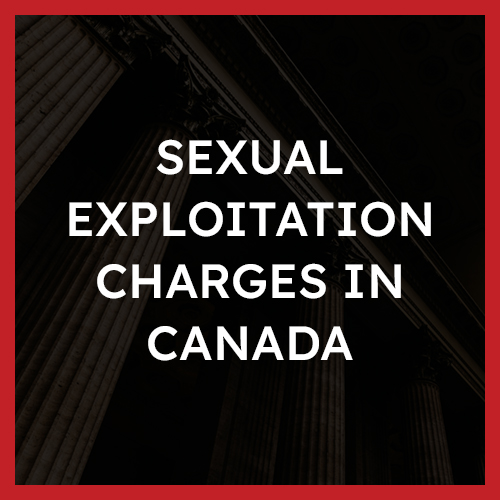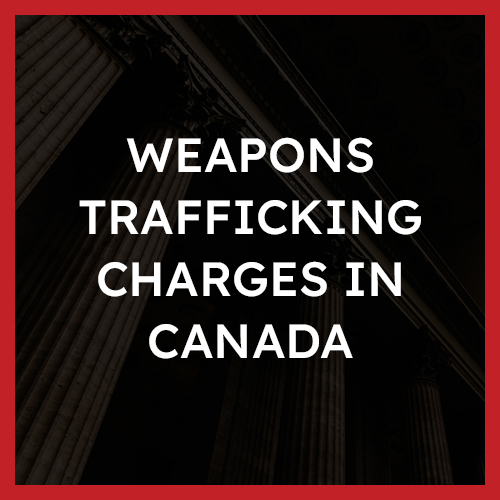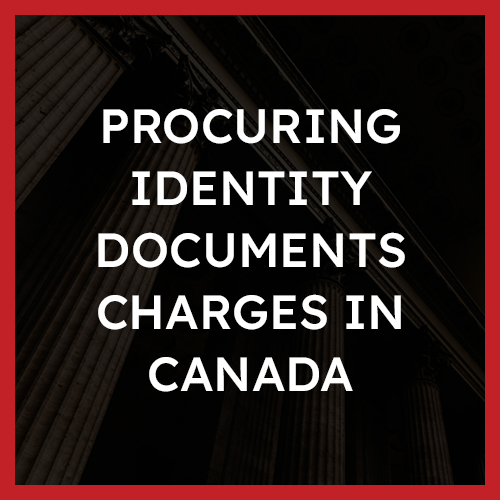Sexual Exploitation (s. 153 (1)) Charges in Canada: Offences, Defences, Punishments
What is Sexual Exploitation?
 Sexual exploitation encompasses the touching “directly or indirectly” of a person between 16-17 years of age for a sexual purpose. It is covered under s. 153(1) of the Criminal Code of Canada (the “Code”).
Sexual exploitation encompasses the touching “directly or indirectly” of a person between 16-17 years of age for a sexual purpose. It is covered under s. 153(1) of the Criminal Code of Canada (the “Code”).
Technological advances in the last 15-20 years have led to an increase in sexual exploitation charges. This is largely because young people are being lured via online platforms such as Facebook, Snapchat and Instagram. Due to this increase, both national and local law enforcement agencies are on high alert for this type of crime and have created specialized teams of experts who investigate and lay charges.
Examples include:
- The Public Safety Canada has led the National Strategy for the Protection of Children from Sexual Exploitation on the Internet;
- The Alberta I.C.E. Unit;
- The Saskatchewan I.C.E. Unit; and
- The Canadian Centre for Child Protection.
Crimes against young persons are treated very seriously in Canadian society, therefore if you or a loved one face this type of charge, it is extremely important that you have the help of a sympathetic and seasoned criminal defence lawyer.
Examples
The most common examples of sexual exploitation in Canada include:
- Engaging in a sexual relationship with a young person as someone in a position of trust (teacher, coach, stepparent, etc);
- Inviting a young person to touch the body of any other person for a sexual purpose;
- Inviting a young person to touch themselves for a sexual purpose.
Defences
Every case is different. Defences that may be available in one case may not be available in another. The strength of any defence rests on the evidence against you and the precise details of the allegations.
There are many defences to sexual exploitation that can be used to raise reasonable doubt in a case. Two of the most effective include showing that you did not touch the young person in a sexual way or showing you had no sexual intent,
Penalties
Sexual exploitation is a hybrid offence, meaning that the Crown can elect to proceed by way of indictment or summary offence. The choice will impact the severity of the punishment you are given, with an indictment being the more severe of the two.
Unlike many hybrid offences in the Code, the punishment for sexual exploitation provides a minimum and maximum sentence regardless of whether the Crown proceeds summarily or by indictment.
The range in punishment is as follows:
- Indictment: A minimum of 1 year imprisonment, up to 14 years.
- Summary: A minimum of 90 days imprisonment, up to 2 years’ less a day.
Critically, regardless of how the Crown proceeds, you can expect the Crown will be seeking a period of incarceration if you are found guilty.
Overview of the Offence
The relevant provision for sexual exploitation in the Code is:
Sexual Exploitation
153 (1) Every person commits an offence who is in a position of trust or authority towards a young person, who is a person with whom the young person is in a relationship of dependency or who is in a relationship with a young person that is exploitative of the young person, and who
(a) for a sexual purpose, touches, directly or indirectly, with a part of the body or with an object, any part of the body of the young person; or
(b) for a sexual purpose, invites, counsels or incites a young person to touch, directly or indirectly, with a part of the body or with an object, the body of any person, including the body of the person who so invites, counsels or incites and the body of the young person.
Young person is defined in the Code as:
Definition of young person
(2) In this section, young person means a person 16 years of age or more but under the age of eighteen years
When determining whether the accused was in a position of trust or authority, there are many factors which are considered. As discussed in R v Aird, 2014 ONCA 447 some of these include:
- The age difference between the accused and young person;
- The degree of control, or persuasiveness exercised by the accused over the young person; and
- The evolution of their relationship.
It is important to remember that in Canada it is your constitutionally protected right to be presumed innocent until proven guilty. This means that the Crown must prove all elements of the offence beyond a reasonable doubt for you to be convicted. If a doubt can be raised that you did not complete the physical or mental components of the offence (as described below) the Crown will not be able to secure a conviction against you.
Actus Reus (The Guilty Act)
The actus reus (physical element) for sexual exploitation required to prove the offence beyond a reasonable doubt is:
- Touching (directly or indirectly) the body of a young person between 16-17 years old;
- The touching was done with an object or a part of the accused’s body; and
- The touching was being done by an adult in a position of trust or authority towards the young person.
It is also an offence for an adult to invite a young person to touch another person for a sexual purpose.
The Guilty Mind (Mens Rea)
In addition to the actus reus, the Crown must also prove beyond a reasonable doubt the mental element of the offence.
Sexual exploitation requires that you:
- Knowingly communicate with a young person for a sexual purpose; and/or
- The touching was done for a sexual purpose.
Sexual Exploitation Defences
As previously mentioned, every case is different. There is no single defence that can be applied to every allegation of sexual exploitation. That said, there are numerous defences available that when used effectively can significantly and positively affect the outcome of a case.
In general, the best defences are:
- Factual Innocence: This is usually the strongest defence because the facts and the evidence do not support you touching the complainant or other basic elements of the offence. This could include:
Identity: In some circumstances, you may be able to raise an identity defence. For example, authorities could have made a mistake in identifying you are the perpetrator. In order to effectively raise this defence, you may need corroborative evidence, as an alibi to where you were at the time of the offence.
- No Sexual Contact: If you can challenge the mental or physical elements of sexual exploitation, then you cannot be convicted. For example, if you did not touch the complainant in a sexual way, you cannot be convicted.
- No Sexual Intent: In order to be convicted of sexual exploitation, there must be a sexual intention behind the act. If a reasonable doubt can be raised as to the intention of the act, specifically that it was not with sexual intent, it is unlikely that you will be found guilty.
- Violation of Constitutional Rights: The Canadian Charter of Rights and Freedoms(the “Charter”) sets out your rights before and after your arrest. If the police fail to abide by these rights, it could aid in your defence.
It is important to note that consent and mistaken age are not a defence to this offence. While there are limited exceptions, they are complex and fact specific.
While the Crown must prove the elements of the offence beyond a reasonable doubt, you bear the responsibility of raising certain defences at trial. The burden of proof remains high for this kind of prosecution. This means that there are many successful defence strategies that our experienced defence lawyers can employ, depending on the circumstances of your case.
Our lawyers have significant experience assessing the availability and strengths of various potential defences in sexual exploitation cases, as well as presenting any and all available defences to the court at trial. Even if you believe that you will be found guilty, it is important that you obtain a legal opinion about defences that may be available to you.
Sexual Exploitation Punishment
The Code outlines the minimum and maximum punishments for sexual exploitation. Like many offences in the Code, it is considered a hybrid offence, meaning the Crown may decide to proceed summarily or by indictment. Indictment being the more serious of the two.
The range in sentences for this charge is as follows:
- Indictment: A minimum of 1 year imprisonment, up to 14 years.
- Summary: A minimum of 90 days imprisonment, up to 2 years’ less a day.
Beyond any immediate jail and/or probation sentence you receive, you can also expect to receive additional penalties, including:
- An order that you give a DNA sample to the national DNA databank;
- A prohibition against owning any weapons;
- A prohibition against going near any pool, schoolyard, public park, or any other location where people under 18 years of age may be found;
- Registry with the National Sex Offender Registry in accordance with the National Sex Offender Information Registry Act (SOIRA).
As a registered sex offender, you will have to provide the police with personal information including:
- Where you live;
- What car you drive; and
- What you do for work.
A conviction for sexual exploitation will result in a mandatory minimum 10-year SOIRA order for just one offence, which can have significant and overwhelming consequences for your future. Under a SOIRA order you are required to report to the Sexual Registry anytime you:
- Change your address or place of residence;
- Change employment or volunteer positions; or
- Travel internationally for more than 7 days.
Furthermore, your personal information will remain in the Sexual Registry database indefinitely.
Even if you intend on accepting responsibility for this type of offence, it is worthwhile to explore your options and consider all the possible penalties. Often, good representation can result in no criminal record. Furthermore, a community-based sentence may be obtained even where the Crown is seeking jail time.
Rest assured, our lawyers will work hard to defend you so that you are not saddled with the consequences that stem from a criminal conviction for voyeurism. In fact, we can canvass a range of sentencing options with the Crown that will either leave you with no criminal record or impose minimal restrictions on your liberty after sentencing. To learn more about potential non-criminal resolutions, please visit our Resolutions page, or read our FAQ on resolutions and other sentencing options.
Frequently Asked Questions
What is sexual exploitation?
Sexual exploitation is a serious criminal offence under section 153 of the Code. It encompasses the touching “directly or indirectly” of a person between 16-17 years of age for a sexual purpose.
What is the punishment for sexual exploitation?
Sexual exploitation is a hybrid offence, meaning that the Crown can elect to proceed by way of indictment or summary offence. This choice will impact the severity of the punishment you are given, with indictment being the more severe of the two.
The range in punishment is as follows:
- Indictment: A minimum of 1 year imprisonment, up to 14 years.
- Summary: A minimum of 90 days imprisonment, up to 2 years’ less a day.
Can you go to jail for sexual exploitation?
Yes. If you are found guilty of sexual exploitation it is expected that the Crown will ask for jail time in line with the sentencing range provided in the Code. This includes a minimum 90-day incarceration period if the Crown proceeds summarily, and 1 year period if by indictment.
Published Decisions
R v SJB, 2018 MBCA 62
The accused was found guilty of sexual exploitation. The Crown appealed the decision of the trial judge and sought a harsher penalty. The accused was stepfather to the complainant, who was 17 years old when he engaged in discussions about having sexual intercourse with her. The accused had sexual intercourse with the complainant multiple times over a two-month period. The court held that the accused knew what he was doing was wrong, he repeatedly engaged in illegal activity and exploited a relationship of trust between a step-father and step-daughter. Although the accused provided a lengthy apology to the court, attended significant therapy and did not have a prior criminal record, his sentence was increased from 18 months in jail to three years.
You can read the full decision here.
R v Lutoslawski, 2010 ONCA 207
The accused was charged with several counts of sexual assault and sexual exploitation. One issue was whether the Crown had shown beyond a reasonable doubt that one of the complainants was under 18 years old at the relevant time. The accused was in a position of trust and authority over the complainant as a scout leader. They engaged in a long-term sexual relationship and the complainant believed she was in love. The court affirmed the trial judge’s finding that although he did not disbelieve the complainant, there was not enough evidence to convince him that the complainant was under 18 at the relevant time. The accused remained not guilty of the sexual exploitation charge.
You can read the full decision here.
Contact Us
If you have been charged with a criminal offence, visit our location pages to contact our team.
About The Author
Ask A Question
We endeavor to respond to questions within 24 hours. If your matter is urgent, please call our office or submit a request for a free consultation.







